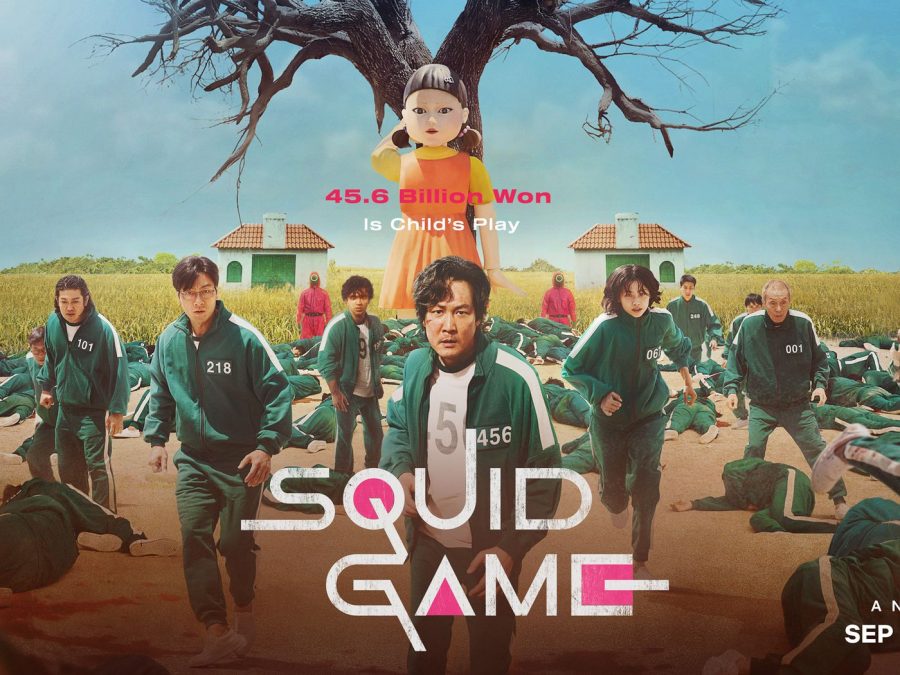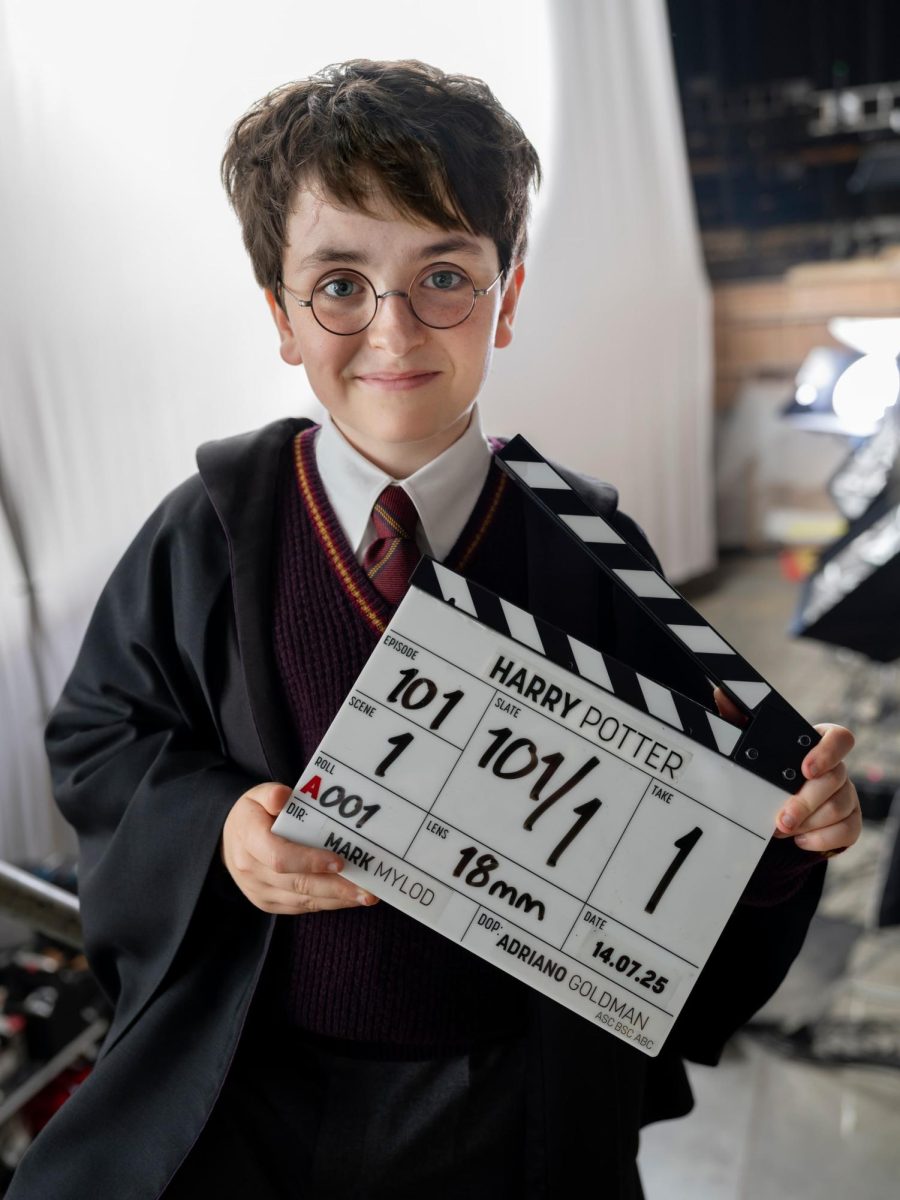An In-Depth Squid Game Review (Major Spoilers).
A review with the insight from a Korean-American
October 25, 2021
The Exposition
When crushed with an overwhelming amount of debt, and a suspiciously too good to be true solution presented, our main character 성기훈 (Seong Gi-Hun) has no choice but to take on the offer. After the company he was loyal to for years fired him, he was left with nothing but a ruined marriage, an elderly mother, a gambling addiction, and pure love for his daughter.
The first episode of the story begins with his story and the epic highs and lows of his life. It’s easy to both sympathize and be upset with this character. He couldn’t remember his own mother’s birthday to withdraw money, but he was doing it all in the name of giving his daughter a good birthday.
The exposition of the story paints us a picture of a rather pathetic man who still tried hard in a not ideal way to win back the life he once had- a perfect setup into the games. As 기훈(Gi-Hun) is left stumped in the train station after dropping his daughter off at her home, the man who offered the games of 딱지 (ddakji) and ultimately the introduction to the squid game appeared. The constant losses and unforgiving slaps 기훈(Gi-Hun) receives to provide a comical and yet symbolic way this man has been his whole life; taking ruthless hits from his environment only to win once and feel like he’s on top of the world. It was quite the hook, and it easily gave me a character to sympathize with from the start.
The Plot
The arena of the games themselves was so mysterious right from the start; a huge facility littered with towering bunk beds and uniformed players who were just as clueless and naive as our protagonist.
When 기훈(Gi-Hun) went to go and take his picture that would later be his character icon on the master floorboards, I found it interesting that in the last minute decided to smile. That symbol of himself he unknowingly made his icon was the last moment where he was the person before the games, before all the tragedy that would change him forever.
무궁화 꽃 이 피었 습니다 (red light green light) began, and the players realized elimination meant death- we are also exposed to the true nature of the game. At the edge of my seat as the first man was shot, that scene was the beginning of it all. We all were made aware of the true stakes of the game, and it was the moment where these innocent childhood Korean games became so much more than that.
Immediately struck with shock and tension, the games continued. 무궁화 꽃 이 피었 습니다 (red light green light) had come to an end, and everyone there had to be faced with the decision to end the games and all go home or to stay in hopes they would win the prize money. And even after the majority decided to go home, the relief we felt would not last long. Each character was reminded almost instantly of why they even went to the games in the first place; life outside was just as bad. Whether it be loan sharks, getting hunted by a foreign gang, or not getting paid by your employer, each character could not avoid the root of all their problems- their lack of money. The show did what any good show does; provide a problem that is a dramatic ethical and moral dilemma.
Most players willingly went back to the game, knowing exactly what the consequences were and being painfully aware that the situation outside was not any better. And that decision brought out everyone’s true colors. The threats from the organization grew to become nothing next to the dangers posed by the other players themselves. What is money, and how hard can it affect someone? How far will one go to get it?
황준호 (Hwang Jun-Ho)’s Side Story
A cop on a mission to find his brother who disappeared, his entanglement into the truth of the games was a wild ride. He intelligently makes his way through the games as a worker, stealing their masks to find the records of his brother.
His intellect and bravery were so appealing, and he quickly became the single hope that the truth of the games would be revealed to the world. It was shattering (but again, kind of predictable) to find out the frontman was in fact his brother. The escape from the men in pink along with the frontman was exhilarating, and I was hoping to dear god all the texts with proof to his boss were sent.
My only hope for 준호 (Jun-Ho) is that he is somehow still alive. Like 일남 (Il-Nam, the old man) his corpse was not explicitly shown, and that in the next season (hopefully there will be one) he will make a comeback.
The Twist of 오일남 (Oh Il-Nam)
오일남 (Oh Il-Nam); the eccentric old man who seemed to have nothing but a grand old time during the games. He happily made his way through 무궁화 꽃 이 피었 습니다 (red light green light) with a big smile on his face and became the oddball weakling 기훈(Gi-Hun) felt he had to care for. The reveal of his true character as the mastermind of the games was a perfect (a bit predictable in my opinion but great nonetheless) twist for the show.
Rewatching the show only to see that his begging on the thermal image cameras in the control room was why the first fight stopped, and so many tiny hints that he was the one who was truly in charge was the ultimate betrayal for me. How he alluded to the familiarity of the neighborhood setting in the marble games when he was the one overseeing the production. How his death -while in the moment was heartbreaking- was the only death that wasn’t explicitly shown when in all other episodes they were not shy about showing other characters vividly getting shot. How he was number 001, the first recorded player in this round of the games, and yet in the records 준호 (Jun-Ho) found, the records of the players began at number 2.
He was hidden in plain sight but brought out the true character of 기훈(Gi-Hun) in the marble games. Acting for so long that the dementia was kicking in, 기훈(Gi-Hun) could do nothing but take advantage of a seemingly poor old man to pick his own life instead of the one who he had been caring for the entire time. So, when 일남 (Il-Nam) revealed that he knew 기훈(Gi-Hun) was cheating him, it only made 기훈(Gi-Hun) face that he wasn’t such a good person after all. It added so much complexity to his character but boiled down to the realities of human nature. In the face of a life or death situation, will you choose yourself or someone else?
The reason why he decided to join the games instead of just watching emphasizes the disgusting nature of the uber-rich. Having so much money that the only kick you get out of life is playing around so effortlessly with life just to show the grim nature of some people and their unwillingness to help the poor. His sociopathic mentality still poses a great question for mankind; would you really step out of your comfort zone to help someone who was that desperate? Even if they initially seem like they don’t deserve it? Do you have the means to even do so?
The VIPS
I found it so interesting how the players were never even aware that they were being watched and bet on like the horses 기훈(Gi-Hun) bet on in the start of the show. The introduction of the VIPS and all the lavish commodities they were presented with clearly portrayed them as the uber-rich, the type of rich where you could do whatever you wanted and never get caught.
Their despicable behavior, along with the viewing room they waited in that used abstractly painted people to use as a lowly footstool only displays their wickedness. How the only remorse they show is when a player they bet on was eliminated, how the one man tried to use 준호 (Jun-Ho) as a sex toy only illustrates that everyone is merely an object to them. And that is all why they were the perfect overall antagonist of the show. They are seemingly untouchable, with no remorse or regret, and part of a top-secret society where human life is the bet. No matter how bad the players have been, no matter their betrayals towards one another, they pale in comparison to the VIPS.
The Characters
The characters all have such distinct personalities that you grow a strong feeling for positive or negative, which is what a great character should do. Each with troubling backgrounds, their reasons for being in the games reveal themselves as the show progresses.
Something mentionable, 조성우 (Cho Sang-Woo), the childhood friend turned business prodigy who peaked in his academic years and flew too close to the sun, which forced him to lose all his property (including his mothers). From the start, he always chose himself. It only became obvious that when the crowd started thinning out where he could not hide from the reality of his selfish survival tactics.
강새벽 (Kang Sae-Byeok), a skilled pickpocket who escaped from North Korea with her kid brother working to break her mother out with them. A strong-willed sister who effortlessly became my (and many others) favorite character.
Ali Abdul, a lovable foreigner in Korean eyes who came as a migrant worker; severely underpaid and wronged by his employer when all he was trying to do was support his wife and child. The strong generous man who saved 기훈(Gi-Hun) with no doubt in his mind caught the hearts of the audience and made everyone want to stab 조성우 (Cho Sang-Woo) for his betrayal in the marble games.
This diverse medley of strangers with nothing in common besides their crippling needs for money created both unusual friendships and predictable conflicts all under the organizations of the games.
The Set Designs
The settings in this show were nothing but phenomenal. Each game was filled with backgrounds that were subtly integral to the game/plot or either had a grand visual aesthetic.
The 뽑기 (bbopki) or honeycomb game was set in a picturesque enlarged playground setting, which my parents gushed over. They rambled on about how as children they would see these 뽑기 (bbopki) vendors outside of their schools or at the local playgrounds to sell to the children. The first death in that scene was quite the dramatic one, which reminded everyone of the drastic consequences of losing when the man’s corpse slumped down the slide leaving a harrowing trail of blood. The neighborhood scenery for the marble game also was essential to a deeper plot in the story, since it would be revealed much later that this was very much likely 오일남 (Oh Il-Nam)’s childhood setting.
Some settings did not have any symbolic significance, such as the tug of war scene or the glass bridge game, but you can’t deny that the set was more than impressive. The mechanisms of the tug of war game where the elevator would place your team at the starting line, the sheer height, and sturdiness of the build itself were eye-catching. The same thing with the bridge scene, the lights, and decorations of the game were so detail-oriented, contributing to the clean delivery of the games. The brightly colored intricate hallways in the show are also quite visually appealing, especially from the overhead shot where you can really see the detailing in the navigation of the staircases.
I loved the stark contrast between the first and last game. The first one was filled with innocent people who had no idea of the stakes of the game, while the last was just between the two childhood friends who were too painfully aware of the stakes. Too much had occurred between them, and I thought that it was perfect that the 오징어 게임(squid game) and 무궁화 꽃 이 피었 습니다 (red light green light) were in the same room. All 456 players’ initial naivety was painted over with blood, so to have it occur in the same room brings a cruel reminder of who they once were of where it all began.
A Korean Insight
I am so excited that this Korean show is taking the world by storm. My coworkers, friends, and even teachers know and have been raving about the show, and it fills me with pride that I have a cultural connection to it. I thought I would share some of the details that someone who isn’t familiar with Korean culture would not know, that I found to be interesting.
- 딱지 (ddakji) is a traditional children’s game where you have to try and flip the opponent’s paper by slamming your paper on top of it. You fold your paper in a certain way and although I never was too good at the game, I have some tips. To have a rather plump playing paper (preferably with thicker paper) gives you quite the advantage. With a heavy arm, a great snap of the wrist, and the perfect angle with consideration of your surroundings to your advantage, slam your way to victory.

- 무궁화 꽃 이 피었 습니다 imitates red light green light. The 무궁화 -hibiscus flower- is our national flower. The sentence essentially translates to “the hibiscus flower has bloomed”, and when you say it has ‘bloomed’-“피었 습니다”- you quickly turn around to try and catch those who are still moving. The infamous doll of that scene is also a familiar character to Korean people, since her cartoon is scattered throughout the papers and workbooks of Korean children. Her name is 영희 (Young-Hee) and the friend alongside her in those workbooks is a little boy named 철수 (Cheol-Su).
- 새벽 (Sae-Byeok), the stoic yet moral girl’s name has a meaning in Korean. Her name quite literally translates into “dawn”. Her death, or more accurately, her murder brings upon a new revelation among the two childhood friends 성우 (Sang-Woo) and 기훈(Gi-Hun). Her new dynamic between the two was solidified, and it dawned (pun intended) upon 기훈(Gi-Hun) that his former friend was a twisted individual.
- Tattoos are still very stigmatized in Korea, so I found it funny how 장덕수 (Jang Deok-Su) had a very prominent face tattoo of a snake. Someone with tattoos (although the stigma is dying down since Korea is beginning to become very westernized) is traditionally seen as someone who is gang-affiliated or just someone associated with crime.
- The background of Ali rings true in the reality of South Korea, as migrant workers are notoriously mistreated. There is an estimated 20,000 Asian migrant workers on farms in South Korea, according to this article. They work in dire conditions, and a Cambodian woman, Nuon Sokkheng even died in these conditions according to the article. Migrant workers being vital and yet abused is an unfortunately very real issue in South Korea.
Overall Thoughts
Edits on social media immediately hooked my interests in the show, and as a Korean-American, I felt obligated to show my support for this smash hit. It poses a great ethical question and has everything a great piece of film has, great characters, a shocking side story and twist, and a great ending that only leaves you wanting more. I was so excited this show was gaining popularity even though most people in America could not understand it without subtitles or dubbing- I greedily inhaled the entire season in a day. After a whole lazy Saturday watching the show -and countless chime-ins from my mother who was non-stop preaching about the evil of loans and irresponsible money management- I couldn’t hold in my smile and mental applause for the show, it was absolutely mesmerizing.












